It reads like the script for a straight-to-streaming low-budget thriller.
Joan: “When I was first getting my bearings around journalists, Luke took me to a gross bar in DC and introduced me to a hacker. I learned more that evening than I ever did in grad school about how the news is made.”
Luke: “This is how we roll. The grosser the better. Sadly all good things must come to an end.”
Joan: “I think I ate tater tots for dinner that night.”
Luke: “You did! And that was a wise choice. The Big Hunt was never about the food. The hacker just belted back firewater behind his laptop.”
But this isn’t the movies. This is an actual Twitter conversation between Joan Donovan, the Head of Research and a lecturer at Harvard’s influential and multi-million dollar endowed Shorenstein Center on Media, Politics and Public Policy and the recently fired HuffPo journalist Luke O’Brien. O’Brien has long been a controversial figure who works closely with Antifa and employs unethical tactics such as doxing and encouraging the harassment of the families of those individuals he targets in his writing.
These are neither the people nor the scene one immediately associates with Harvard - arguably the leading brand in global higher education. And yet, not only is hacking now best practice at Harvard, but individuals like O’Brien can fail upwards from being fired by the HuffPo to being a research fellow in its hallowed halls. The consequences of this kind of rot have been as immediate as one might expect.
The Harvard Shorenstein Centre hosts six major research projects one of which, The Technology and Social Change project, is headed by Joan Donovan. The project “explores media manipulation as a means to control public conversation, derail democracy, and disrupt society”. It is here that Luke O’Brien was offered a fellowship after being dismissed by HuffPo. Apart from being an Antifa and hacker-linked journalist, O’Brien has garnered a reputation for spreading disinformation online and using his network of friends in the media to amplify it. A strange hire for a disinformation centre.
Worryingly, as their dive bar meeting would suggest, O’Brien was hired because of his activism, his unethical reporting, his propensity for sharing disinformation and because he introduced Donovan to the shady world of hacking. Some of her other hires confirm the pattern.
Brandy Zadrozny was also given a fellowship by Donovan. Zadrozny works for NBC News as a disinformation and online extremism reporter. Like O’Brien she has been accused of using unethical practices in her reporting. She has written a guide to OSINT research tools for online reporting which helps reporters to identify and dox targets. She uses these tools to target Republicans and especially Trump supporters, writing lurid and sensationalist political hit pieces. Importantly, and again like O’Brien, Zadrozny has a history of spreading disinformation online. In June of 2020, while riots raged across the US in the wake of the death of George Floyd, Zadrozny and her partner at NBC - Ben Collins - stoked racial tensions by claiming that a tweet which called for Antifa to go to the white suburbs and cause trouble was the work of the far-right group Identity Evropa. The problem? Identity Evropa disbanded in 2019. The tweet was in fact by a notorious Twitter parody Antifa account. Zadrozny and Collins, with their NBC article, wrote the most dangerous piece of racially inflammatory disinformation in modern mainstream journalism. Her reward? A fellowship at the Harvard Shorenstein Centre.
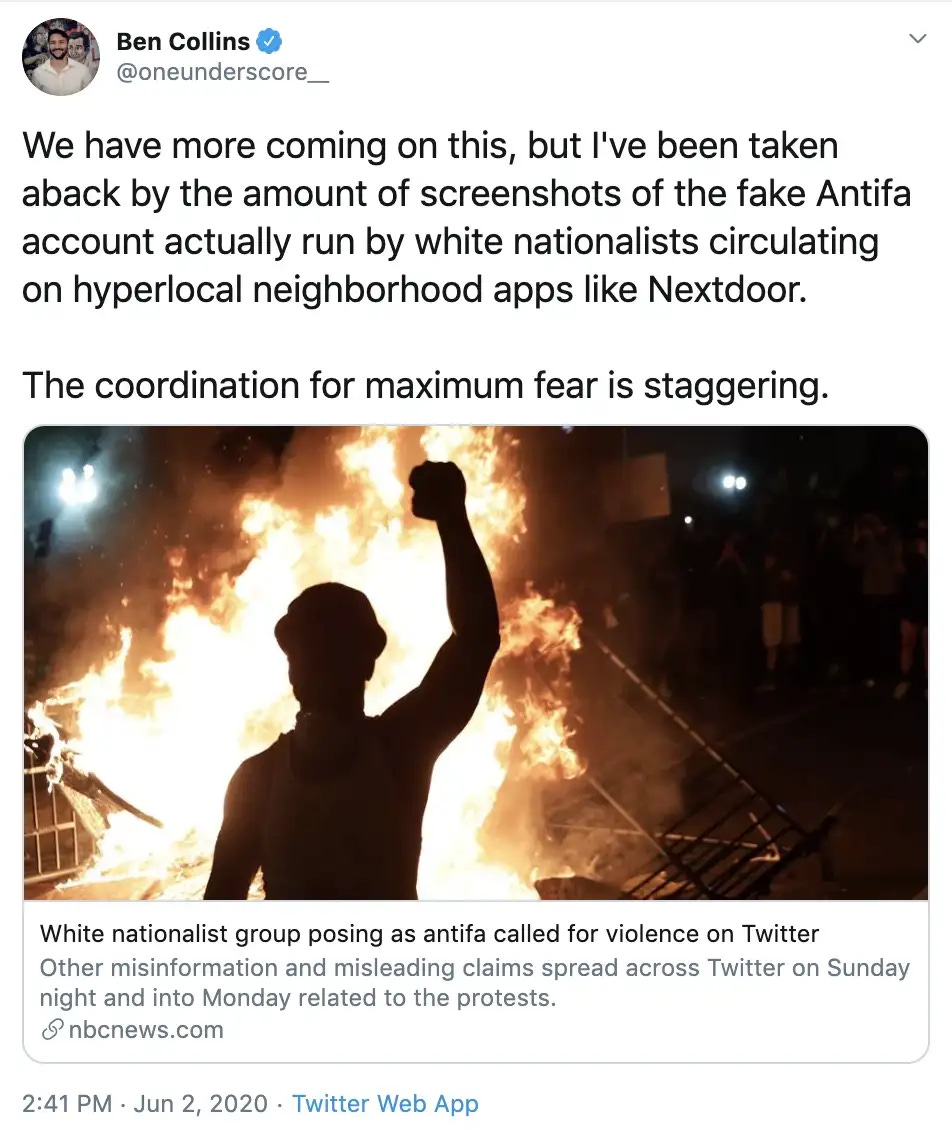
Erin Gallagher was hired as a research assistant by Donovan. Prior to this position Gallagher was a little known Twitter activist who wrote for the now defunct “Revolution News”, a hard-left collection of independent bloggers and activists that covered socialist struggles worldwide. Both Revolution News and its administrator were banned from Twitter several times. Gallagher currently runs a Medium blog where she creates attractive but analytically weak graphs of right-wing Twitter communities using the social network mapping tool Gephi. In a recent article she wrote for her own Medium blog called “Visualising Cyber Harassment” about a group called “The Shed”. Gallagher makes the same error as Zadrozny and attributes the parody account “IE” to Identity Evropa. Again, it is an error that displays either an unforgivable ignorance of the Twitter extremist scene or an unethical willingness to make the data fit predetermined outcomes. Does either scenario merit a research position at Harvard? Obviously not.
Gallagher’s only article for the centre’s “Media Manipulation Casebook” titled “Butterfly attack: Impersonating a group identity in order to discredit them or drive social wedges” is a study of fake Antifa accounts on Twitter. It was immediately attacked by far-left activists Avi Bueno and Caroline Orr upon its publication. In a long thread on Twitter, Bueno accused Gallagher of knowingly omitting the work Orr had previously done on fake Antifa accounts. Bueno was incensed that Gallagher did not include a reference to Orr’s work though she knew about that work and was influenced by it. By omitting Orr’s previous research and reporting in this area, Gallagher put herself forward as the pioneering expert in the area. Importantly, Donovan also knew of Orr’s work, referencing it in a 2019 report for Data and Society. This is deeply unethical academic practice. In response to his complaints, both Gallagher and Donovan blocked Bueno on Twitter.
The issue with all of these hirings is that despite the massive budget at her disposal, Donovan is not looking to employ seasoned academics or accomplished professionals. She is, rather, intentionally packing her department with divisive ideologues who engage in unethical behaviours and put political ideology before academic best practice. She has repeatedly returned to the Twitter well to find activists who employ grubby tactics - hackers, doxers and pseudo-social network analysts. It’s Antifa Twitter but with Harvard credentials.
Donovan, a former member of a Boston punk band, emerged from the Occupy Wall Street movement in 2011/12. While a PhD candidate at UC San Diego she joined the protestors at Occupy LA in an organisational role. She blogged about her experiences in a now scrubbed blog called “Occupy the Social” where her bio stated “My role at Occupy LA is to travel between Southern California camps, meet people, and coordinate actions through occupysocalcommunication.com. I also work with fellow occupiers on interoccupy.org, where we use conference calling technology to connect occupations all over the world.”
In a post in “Waging Nonviolence” Donovan explained how this worked. “First, InterOccupy developed a database to log volunteers. Using open-source CiviCRM software, the network began gathering information about housing, work experience, languages spoken and more. Eventually, the online infrastructure grew as thousands of people signed up to volunteer and millions of dollars in cash and goods were collected…With access to the database, I could find specific types of volunteers to fulfil needs in Brooklyn from my apartment in Los Angeles. I also arranged numerous shipments and hundreds of volunteers by staffing the main inbox, which could get as many as 1,000 emails per day.”
Even as the Occupy movement descended into violence and became hijacked by the anarchist elements of the movement, Donovan continued to organise. She even expressed empathy for the more violent Anarchist elements in the movement. In a post in her now defunct blog called “Radical Imaginaries: Community Uprisings and the Occupy Movement” she states of police confrontation: “Uprisings are a time to create new tactics, forge solidarities, and strengthen alliances. Or, you can just light trashcan fires. It’s really up to you.”
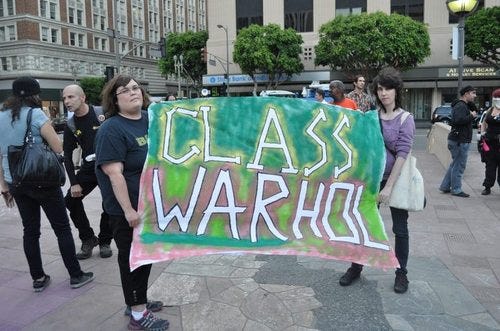
For Donovan, the takeaway from the Occupy movement was a long-term vision for enmeshing online activist organisation and academic research. In a post recounting her experiences at Occupy, she stated that the future of online activism was the model she has helped develop. Small networks of activists would have to use the internet to centralise organisational resources and “use funds to establish centres focused on organising against racism, poverty and foreclosure, among other local concerns”. The most successful example of what she is talking about in the wake of the Occupy movement has been Antifa’s ability to organise and communicate both nationally and internationally using Twitter. The link is direct. Mark Bray, arguably the most influential individual in the US Antifa movement, and author of Antifa: The Anti-Fascist Handbook also had his start at Occupy. For him, Occupy was an explicitly Anarchist movement. And on social media, Antifa have organised themselves explicitly along the lines pioneered by Donovan and InterOccupy.
For Donovan, Occupy was a crystallising moment in her life. She has stated of her time with Occupy: “I now realise how little I comprehended by reading about direct action without also experiencing it…By being involved in Occupy protests, I…broke with the norms of public decency and challenged authority by standing up to the state. Moreover, I had to confront my own middle class privilege and bourgeois values…Eventually, I had to accept that I was no longer “just doing ethnography”.” She has used what she learned in LA to forge an academic career out of deplatforming and demonetising individuals she is politically opposed to under the academic veneer of tackling disinformation. In a recent talk at Penn State to protest a comedy show by Gavin McInnes, Donovan made the case for deplatforming and demonetising McInnes both on campus and online and she spent a significant part of the lecture doxing members of The Proud Boys. The talk was less an academic lecture and more Antifa-style direct action.
In 2017-18 Donovan was the lead for Data and Society’s Media Manipulation Initiative when it published the controversial “Alternative Influence” report by Rebecca Lewis. The report attempted to prove that YouTube was enabling a conservative-to-white-nationalist pipeline by not suppressing certain individuals and talking points in its algorithm.
Aside from questions surrounding the subjective nature of the snowball sampling method employed and how the author determined the boundaries of her study, the lack of unbiased interrogation of her dataset is concerning. Looking at her graph, one is led to infer a direct connection between Joe Rogan and Richard Spencer. Rogan interviewed Carl Benjamin and Benjamin interviewed Spencer therefore Rogan’s viewers will become radicalised. There are two important flaws here. First, Lewis provides no data showing that there is a significant audience crossover from Rogan to Spencer via Benjamin or any other individual in the network for that matter. Lines on a graph do not equal clicks and subscriptions.
Importantly, the reason Benjamin had Spencer on his channel was to debate his views - which Benjamin found repugnant. Benjamin spoke to Spencer to reject his ideas. Benjamin could just as easily be seen as a buffer to the far-right Spencer for Rogan fans. We would need hard data to tell. Similarly, speaking of Dave Rubin on page 38 of her report, Lewis states, “…social networking between influencers makes it easy for audience members to be incrementally exposed to, and come to trust, ever more extremist political positions.” Again, this is a bold claim that requires evidence which is not provided. She assumes that YouTube viewers are incapable of discernment. Once someone hears Richard Spencer make a far-right comment, rebutted or not, then the viewer, as if by magic, falls under the spell of his words and inevitably becomes a white supremacist. Such black and white conclusions without supporting evidence are a hallmark of agenda-driven research.
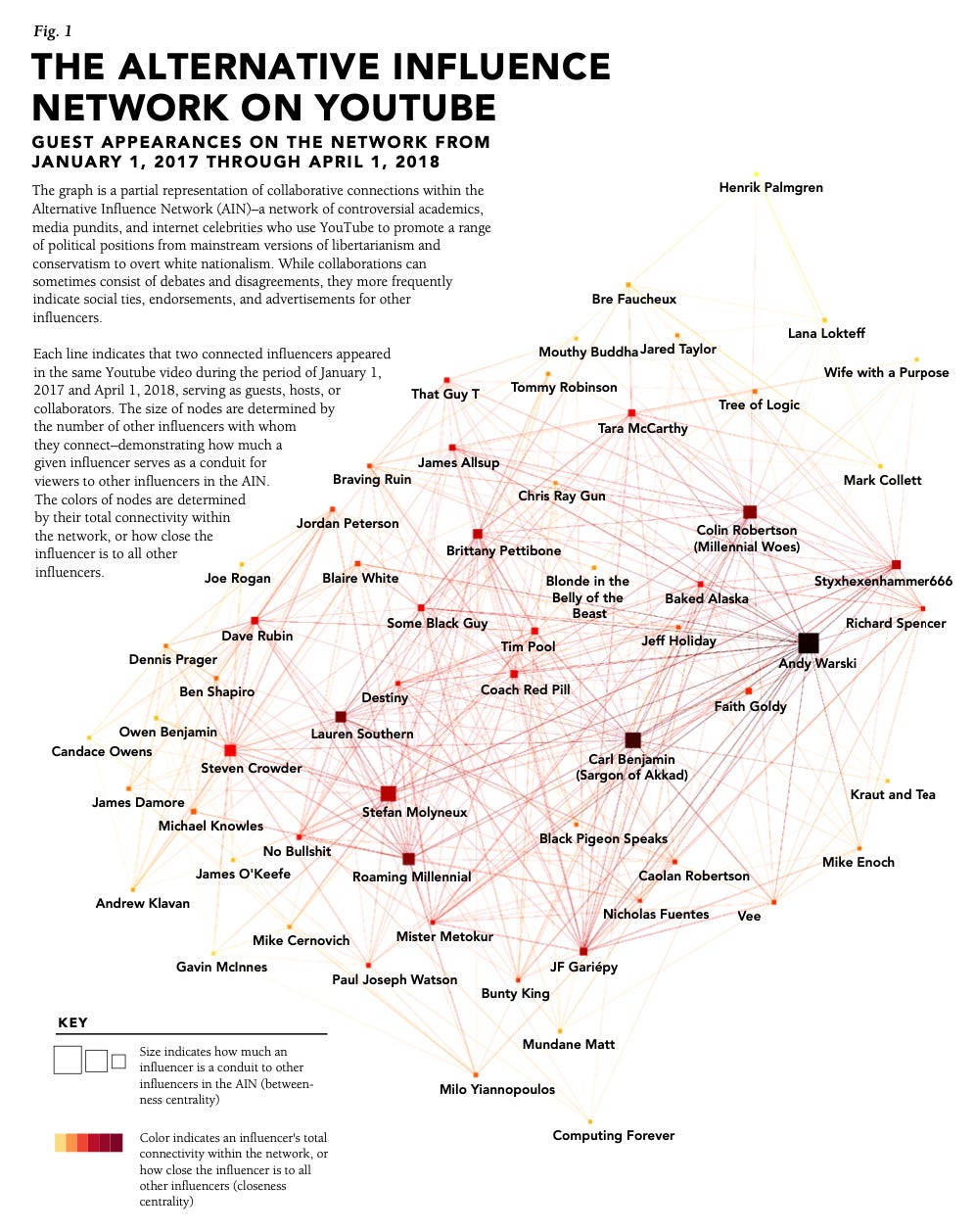
The report overwhelmingly relies upon anecdotal evidence from hundreds of hours of video to prove her point that there is a far-right pipeline but there is no empirical data to back it up. In a section labeled “Audience Radicalisation” Lewis uses the example of Dave Rubin hosting Sefan Molyneaux who claims that there is a link between race and IQ. Lewis spends three pages describing the encounter before admitting that there is no empirical evidence to suggest that Rubin’s audience has been radicalised or that a significant proportion of his audience then followed Molyneaux. Instead she uses one comment from the comments section of the video to infer that viewers are radicalised. A subjectively chosen comment on a video is poor evidence indeed.
Lewis included no keyword or lexical analysis of transcripts of the videos chosen for her study. Even if she had produced a statistical analysis of “hate speech” or some such keywords gleaned from the interviews from which a ranking of extremist content could be generated, it would have produced something useful to analyse. What we get instead are hand-picked viewer comments to support the author’s argument.
On page 6 of the report Lewis claims the study includes evidence of “… influencers radicalizing their audiences, each other, or being radicalized by their own audience’s engagement.” She summarises, “I argue that YouTube should reassess both their monetization incentive programs and their content moderation practices.” And yet on page 39, Lewis states, “It would take more empirical research to determine the extent to which guest appearances like Molyneux with Rubin effectively radicalize viewers.” Indeed it would take at least some empirical evidence because none has been provided in this report. That is because the report is a work of activism with the goal of deplatforming and demonetising political opposition.
The Alternative Influence Network report bears an uncanny resemblance to the equally problematic work of Erin Gallagher for Donovan’s Media Manipulation Casebook. Donovan, herself seemingly ignorant of programming and social network analysis, hires people who have a functional knowledge of the field, enough to produce pseudo-academic activist reports. Hiring a known and skilled computer programmer would immediately solve her problems and lend fantastic credibility to research produced by the centre but that is seemingly an unwelcome solution. Indeed what unites all of Donovan’s hires is that they are activists hiding behind the legitimacy that their credentials as Harvard researchers bestow upon them.
Connected to these concerning personnel hires there appears to be a deeper rot at the Shorenstein centre. The centre operates the Harvard Kennedy School Misinformation Review, a peer-reviewed journal dealing with the spread of mis- and disinformation. In December of 2021 the journal was forced to publish a humiliating retraction of one of its papers - Disinformation Creep: ADOS and the Weaponisation of Breaking News. The article’s main thrust was that ADOS - American Descendants of Slavery Advocacy Foundation - hijacked news events on social media to encourage African Americans to not vote Democrat. The methodology was deeply flawed. As just one example, the researchers conducted a hashtag analysis for the term #ADOS and tracked it over eleven months identifying spikes in appearance which researchers linked to events such as the death of Chadwick Boseman, MLK day etc. Researchers claimed this amounted to a concerted and coordinated attempt to use these events to influence black voters away from the Democratic Party. However, the term #ADOS is used on French Twitter and for other causes. Researchers did not weed out these - many - false returns and so irreparably contaminated their dataset. When ADOS officials raised concerns with Donovan on Twitter, predictably, she blocked them. After a sustained pressure campaign and an official rebuttal by ADOS forced an internal review of the article, it was concluded that “The argument by Nkonde et al 2021 appears to rely entirely on subjective interpretations of a handful of tweets tweeted by the ADOS movement’s founders…While these interpretative claims occur within an atmosphere of scientific method and big data, the role of these data and methods is never clarified, leaving the reader to wonder if they factored in at all.” Again, why wasn’t an expert like this involved in the initial peer-review process?
Like the Alternative Influence Network and Butterfly Attack pieces, the ADOS article amounted to little more than an academic hit piece - subjective and politically motivated interpretations of cherry-picked social media posts shrouded in a “cloud of scientific method and big data”.
The ADOS article had ten co-authors, five of which work with the Democratic Party political action committee MoveOn whose supposed aim is to stop disinformation and online voter suppression. MoveOn has had a long-running conflict with ADOS who they see as a threat to their political organisational efforts within the black community. The paper was an obvious hit piece. This fact alone should have removed it from consideration for the journal or at the very least, it should have been cause for extra caution among HKS Misinformation Review peer reviewers. Instead, the clearly flawed paper passed peer review and was published.
The publication of the paper and the harm inflicted upon the individuals at ADOS is the result of the activist rot at Harvard’s Shorenstein Centre. Harvard hired an activist to head up a multi-million dollar research department and she, in turn, hired other activists. With that kind of budget and the Harvard name at her disposal, Joan Donovan could hire almost any data scientist and/or journalist in the world. Instead she has chosen partisan and controversial activists from Twitter. In a highly partisan atmosphere, everything from curriculum to research becomes contaminated. What the ADOS case shows is that the activist rot is so deep at Harvard that even their pool of peer reviewers is infected. Peer review is the gold standard for academic research but at Harvard’s Shorenstein centre, a supposed leader in disinformation studies, everything from teaching to research to peer review is rotten. Harvard’s Shorenstein centre is fast becoming the leading purveyor of disinformation online.




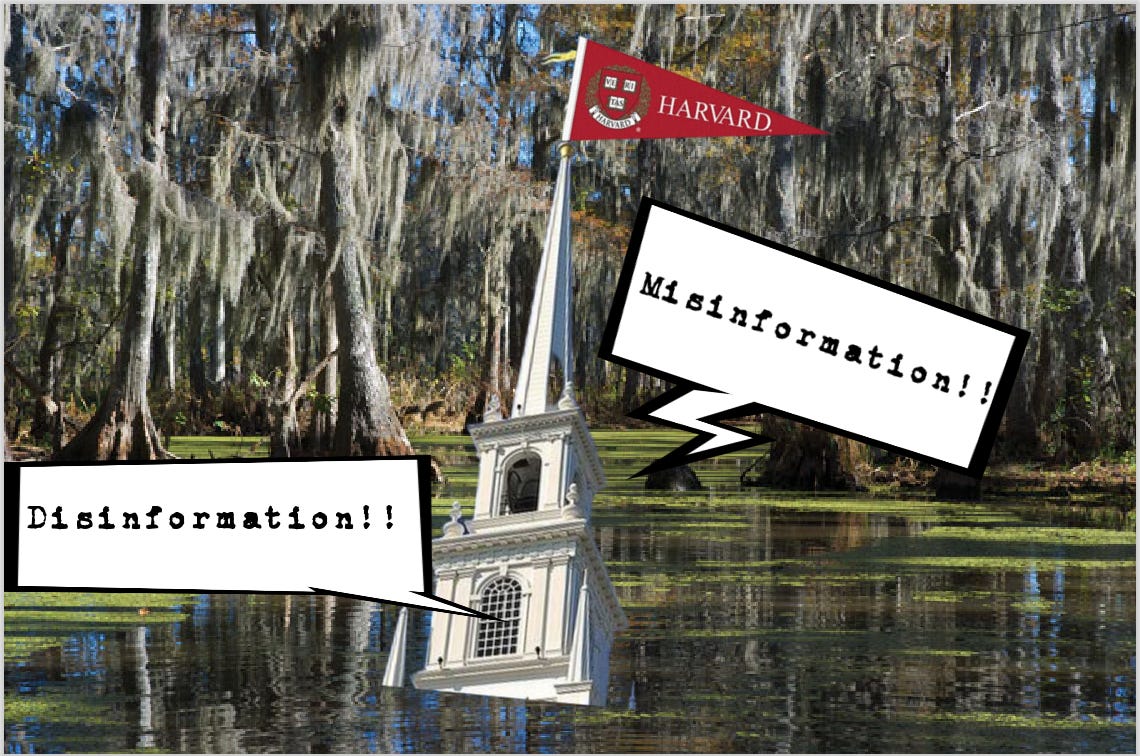
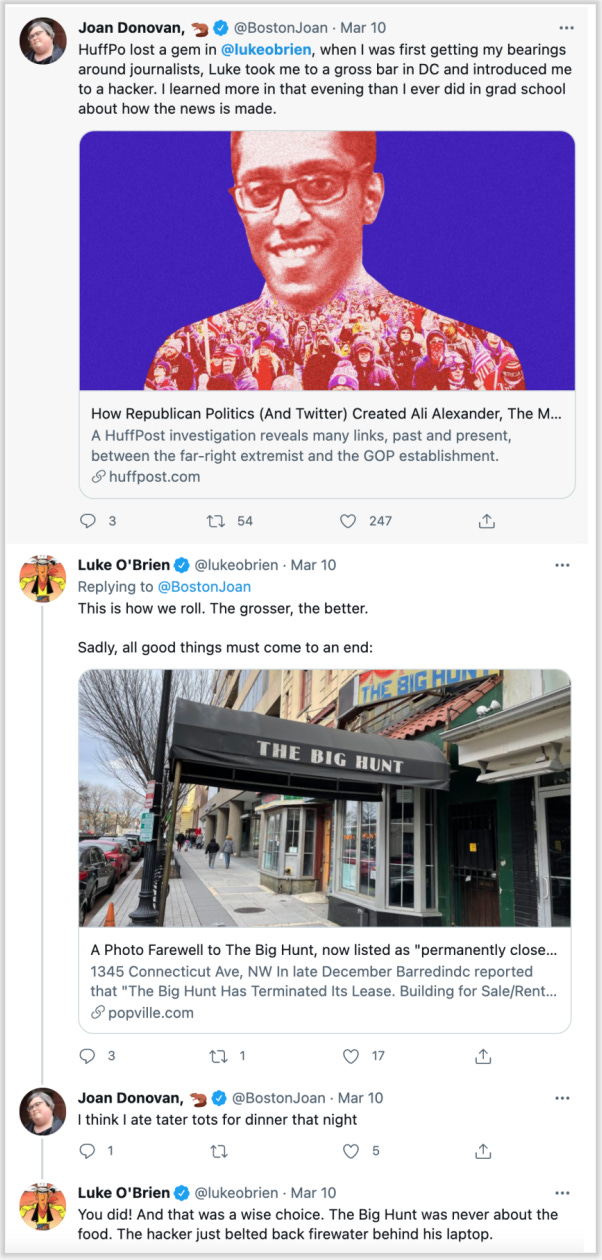
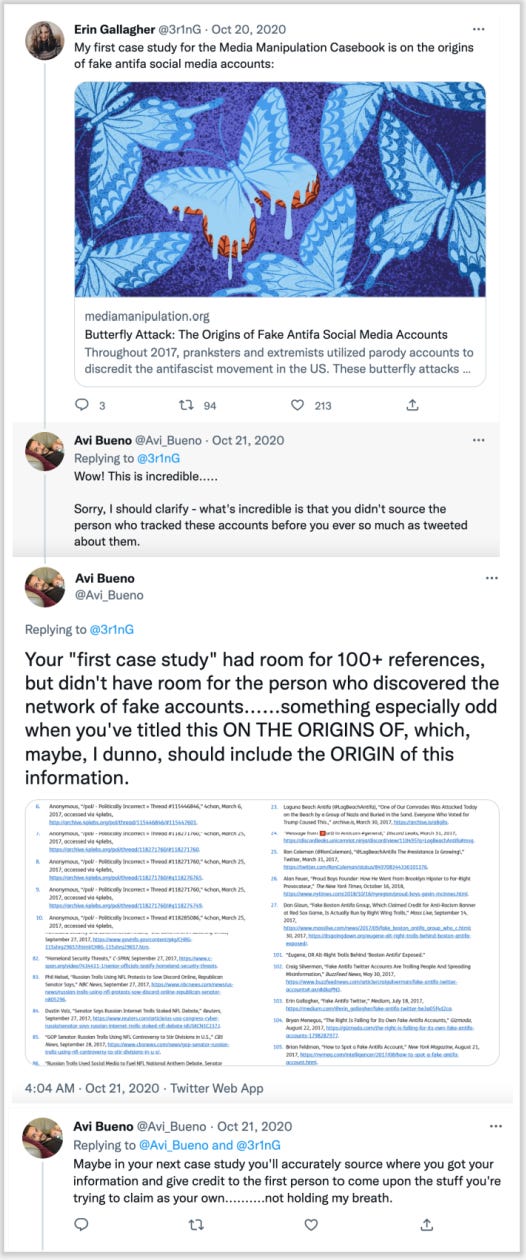
Excellent overview of Donovan!
I reported this yesterday:
https://jennyhatch.substack.com/p/breaking-joan-donovan-out-at-harvard
I added a link to this article in my report.
Great work!
Jenny Hatch